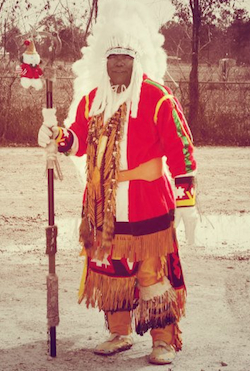Indian Santa: Garnering Support for the United Houma Nation through an Award-Winning Documentary
 Indian Santa is a short documentary about, as the name suggests, Indian Santa. The tradition was started in 1985 when Hurricane Juan devastated the Houma Indian communities along the Gulf Coast. The Houma families received little help after the storm, and presents were going to be absent from many Houma children's Christmas.
Indian Santa is a short documentary about, as the name suggests, Indian Santa. The tradition was started in 1985 when Hurricane Juan devastated the Houma Indian communities along the Gulf Coast. The Houma families received little help after the storm, and presents were going to be absent from many Houma children's Christmas.
Joe Dardard, a Houma Indian, decided to take action. He teamed up with Toys for Tots and dressed as Santa--with a twist. In addition to the red Santa suit, Joe Dardard donned a traditional tribal headdress. The result, children in the Houma community received at least a moment of joy during the holiday. Over 20 years later, Indian Santa continues to spread Christmas cheer throughout the Houma Indian community. Thomas Dardar, Joe's nephew and Principal Chief of the United Houma Nation, has been serving as Indian Santa for the past seven years.
I produced the film because, although several chapters in books and a few films have mentioned the Houma, all of those pieces focus on the adversity the tribe faces. I wanted to show something genial happening within the tribe.
Photo: Principal Chief Thomas Dardar as Indian Santa in 2011, courtesy of 'Indian Santa'.
Indian Santa was scheduled to be shown December 6th and 8th at the Smithsonian's National Museum of the American Indian's "At the Movies" Screening Series with My Louisiana Love but due to Hurricane Sandy, the screening has been moved to the spring of 2013. Indian Santa is an official selection of the New Orleans Film Festival, the South Alabama Film Festival, the Life Film Festival (Winner Best Documentary), and the American Indian Film Festival.
Just as Indian Santa is a tradition among the Houma, dealing with disaster has become part of the Houma culture as well.
Hurricanes and the BP spill have absolutely crippled many citizens of the United Houma Nation, who primarily work in the seafood and oil industries. This year, Hurricane Isaac wreaked havoc in Braithwaite, Louisiana, a Houma Indian community.
Aside from disaster, another constant is the federal government's persistent refusal to acknowledge the United Houma Nation as an Indian tribe. Houma Indian children were forced to attend a segregated Indian school until 1969; that is, five years after the passage of the Civil Rights of 1964 officially desegregated society. Nevertheless, the federal government insists the Houma are not an Indian tribe.
Federal recognition would be immensely beneficial to the Houma because it would make the tribe eligible for disaster relief programs and funds to help combat coastal erosion. Coastal erosion is major reason recent hurricanes have been unusually impactful. The barrier islands, now vanished, served as a buffer weakening hurricanes before they hit coastal populations – the Houma. Thanks to the vanished islands and shrinking coastline, Houma Indian communities such as Isle de Jean Charles and Point-Aux-Chenes are now the storm buffer.
The BP disaster serves the most obvious example of how lack of federal recognition harms the Houma. In response the United Houma Nation's damages claim, BP replied:
"While BP indeed processes claims from federally recognized Indian Tribes through this process, our review of your claim submission indicates that the United Houma Nation is not a federally recognized Indian Tribe entitled to assert claims pursuant to the Oil Pollution Act of 1990 ('OPA'). Therefore, we are closing your claim file with regard to this matter."
Indian Santa is lighthearted movie. It spotlights something positive happening in a community wrought with hardship. My hope is the film's success will bring interest to the tribe, its ongoing struggles, and support from allies. The more national recognition the UHN receives, the closer the UHN will be to federal recognition.
Learn more about Indian Santa at the film's website or Facebook page.
Related Post: Troubled Waters: Discussion with Louisiana Documentarian Monique Verdin
Adam Crepelle is a citizen of the United Houma Nation. He serves on the tribe’s Tribal Security and Community Services Committee and the tribe’s Diabetes’s Coalition. Adam received his degree in exercise science from the University of Louisiana Lafayette in 2009. He is currently in his third year at Southern University Law Center.
